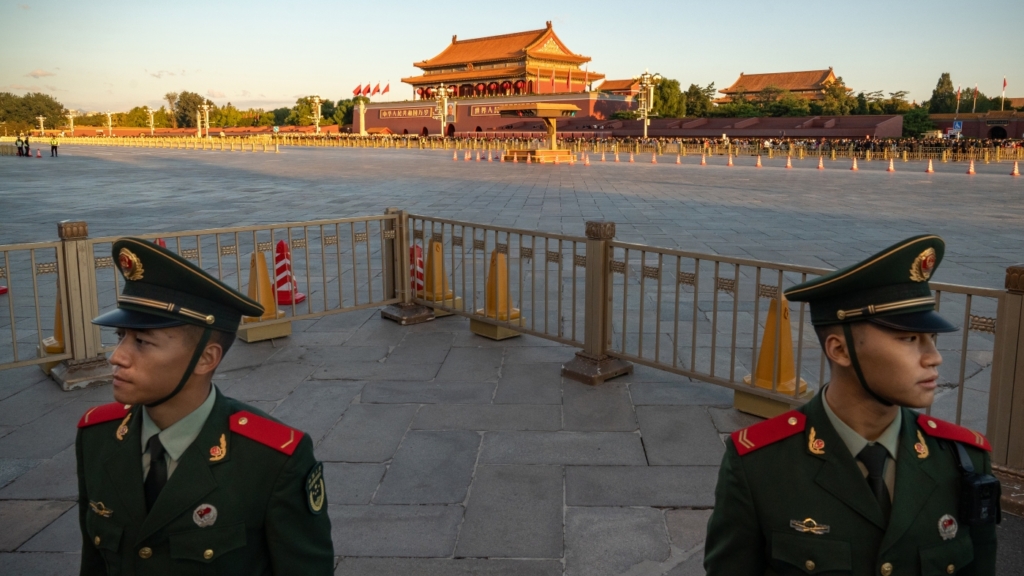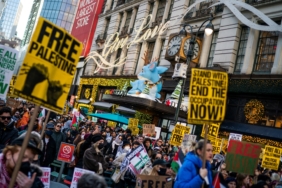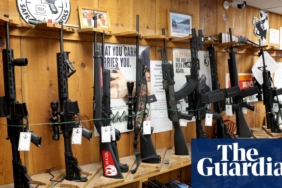People’s Liberation Army soldiers stand guard in Tiananmen Square at the end of the flag-raising ceremony marking the 75th anniversary of the founding of the People’s Republic of China, in Beijing, on Oct. 1.
Andrea Verdelli/Bloomberg via Getty Images
hide caption
toggle caption
Andrea Verdelli/Bloomberg via Getty Images
BEIJING — It was my second attempt in as many days to visit Tiananmen Square, and it wasn’t looking good.
When I tried the day before, a guard said I required an online appointment — and, no, I couldn’t make a same-day booking. So, I scanned a QR code, entered my name and passport number, and returned the following day.
Now, I was at the front of a line of dozens of people trying to get onto the world’s biggest public square.
Just making it here was a process: There was a police ID check to exit the nearby subway station. Another to get in line on the sidewalk. A third while standing in line. And now, there was a fourth — by a towering police officer standing before a bank of metal detectors and X-ray machines — the final inspection.
My journalist visa caught his eye. He told me to step aside, and radioed his boss.
People line up at a security checkpoint to enter Tiananmen Square in Beijing.
John Ruwitch/NPR
hide caption
toggle caption
John Ruwitch/NPR
Another cop arrived. Foreign reporters, he said apologetically, need special permission. And I did not have it.
Seventy-five years ago last month, Chinese revolutionary leader Mao Zedong declared the founding of the People’s Republic from atop Tiananmen, the Gate of Heavenly Peace. Situated on the southern edge of the imperial Forbidden City, few symbols of power in China rival it.
The vast square that unfolds at its feet is another symbol of power, which over the decades has vacillated between people — and the state.
A protest tradition took root in Tiananmen Square more than 100 years ago when students marched through the square in 1919 — the May Fourth Movement. They were protesting the terms of the Treaty of Versailles at the end of World War I.
After the Communist Party took power in 1949, it expanded the square. The party installed two huge buildings on its east and west flanks — and placed a monument to heroes of the revolution in the middle.
“That all happened in the 1950s, basically to prepare for 1959, which was the 10th anniversary,” says Yu Shuishan, an expert on Beijing’s urban architecture at Northeastern University.
And the party had a model in mind. “Basically, copying Moscow,” Yu says.
The square was to be a grand public venue, like the Soviet Union’s Red Square, for parades and mass gatherings.
State power
In the 1960s and ’70s, Mao brought thousands of young Red Guards to Tiananmen Square to sing his praises during the Cultural Revolution.
There have been military parades for milestone anniversaries of the founding of the country, and celebrations for other major events, including the 2021 centenary of the establishment of the Communist Party of China.
Those big shows of state power jostled against other things happening in the square. In 1976, thousands gathered in Tiananmen Square spontaneously to mourn the death of Premier Zhou Enlai.
There were protests there in the 1980s — and in 1989, students took over the square for months — until the army crushed the movement.
Those protests, and the crackdown, broadcast across the world, brought the square more attention — and enhanced its significance and sensitivity.
A propaganda team formed by China’s revolutionary Red Guards recite quotations from Mao Zedong on Tiananmen Square in Beijing, Nov. 2, 1966.
Xinhua/AFP via Getty Images
hide caption
toggle caption
Xinhua/AFP via Getty Images
Security in Tiananmen Square increased. But it was still possible to hang out there. People flew kites in the square. You could bike or skateboard there.
Sporadic demonstrations still occurred in the 1990s and 2000s. Most were small, and ended quickly in a swarm of plainclothes and uniformed police patrolling the square.
I’ve seen petitioners toss leaflets into the air at Tiananmen, and unfurl banners. Rep. Nancy Pelosi even did so in 1991 to memorialize demonstrators killed in 1989.
People have lit themselves on fire in Tiananmen Square in apparent protest.
And in 2013, extremists who the government said were linked to a separatist movement drove an SUV through a crowd, leaving several people dead, in front of Tiananmen Gate.
Security was again ratcheted up. Metal detectors and X-ray machines went in. During the coronavirus pandemic, the authorities added a digital booking system to enter — demanding IDs or passports, and controlling the number of people who go onto the square, ostensibly in the name of public health.
Police cars block off the roads leading into Tiananmen Square as smoke rises after a vehicle crashed in front of Tiananmen Gate in Beijing, on Oct. 28, 2013, killing several people.
STR/AFP via Getty Images
hide caption
toggle caption
STR/AFP via Getty Images
The booking system has remained in place.
“In the past, you could do anything there,” says a 69-year-old man surnamed Liu, who has lived around the corner his whole life. He declined to tell NPR his full name out of concern about speaking frankly to a foreign reporter.
“Now, you absolutely can’t do anything.”
Elizabeth Perry, an expert on Chinese politics and protests at Harvard University, says the intensified security reflects the insecurities of the current leadership.
Chinese President Xi Jinping “is very insecure,” she says.
“Not that the party ever welcomed popular protest, but could certainly live with it. But I think that that sense has now disappeared and that any kind of protest, even if it’s very limited demographically and geographically, is seen as potentially dangerous by the party,” she adds.
Perry says that may relate to the way Xi has ruled — culling rivals with an anti-corruption campaign, consolidating power, abolishing term limits and putting the Communist Party back in the center of everyday life. Security has tightened across the board. At the same time, the economy has been floundering.
“There seems to be a kind of collective doom that the current leadership could be in place for a very long time, and there is no longer any institutionalized mechanism for leadership succession,” she says.
Tourists don’t seem bothered by the extra security at Tiananmen Square, which travelers consider a “must visit” in Beijing.
Xie Bin came from the city of Hangzhou to see the square with her kids, who were decked out in red stickers and little Chinese flags. She says it was a good experience.
Security officers stand watch at a road near Tiananmen Square in Beijing, June 4, as China heightened security for the 35th anniversary of a bloody crackdown on pro-democracy protests there.
Andy Wong/AP
hide caption
toggle caption
Andy Wong/AP
“[The authorities] have their own considerations for making these restrictions, and as visitors we just need to respect the decision,” she says on a street nearby.
In September, I tried to visit Tiananmen Square again, hoping the third time’s a charm.
NPR requested permission through the Foreign Ministry, which contacted a government office that manages the square and the area around it. After waiting nearly a week, on a glorious early fall day, the request was granted.
I had been on the square countless times, as a tourist and as a student. In more recent years, I had visited as a journalist when foreign leaders were welcomed to China, or when the square was converted into a giant parking lot for party conclaves or sessions of parliament.
People pose for photos in front of Tiananmen, the Gate of Heavenly Peace, in Beijing.
John Ruwitch/NPR
hide caption
toggle caption
John Ruwitch/NPR
Years ago, it felt like an open, organic part of Beijing. Now, it feels like consecrated ground.
A group of tourists from China’s northeast invited me to join them for a photo, with the famous portrait of Mao in the background.
I obliged, but we didn’t talk. A government official and a police officer accompanied me on my visit to the square. And I had been told that interviews were off limits.















Yorumlar kapalı.